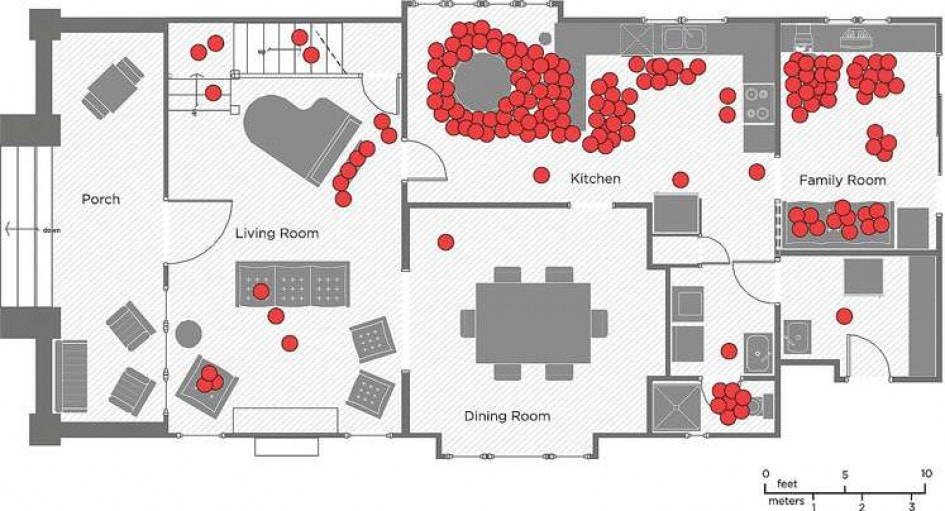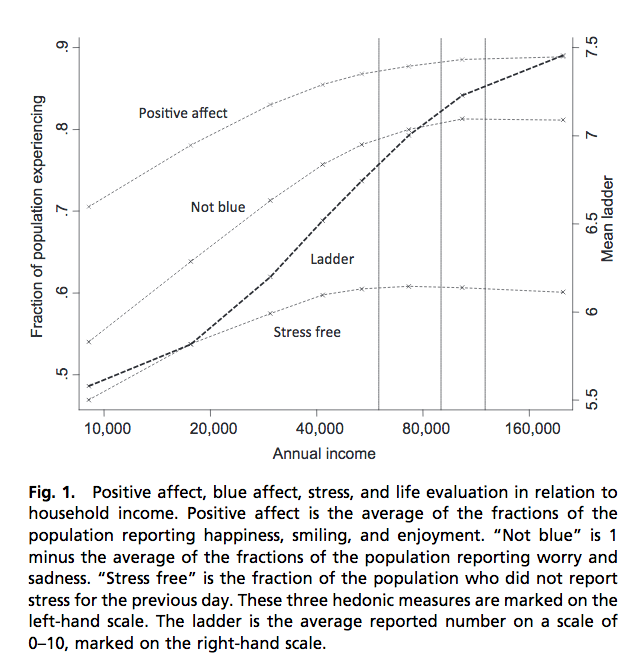Material Objects Do Not Bring Happiness
So much of life takes place in a fog a habitual human behavior. We spend so much time "hunting" for things we think we need. As a result, this constant hunt makes us miserable; attempting for fill a void by the consumption of stuff. Attempting to buy the way to happiness, people are addicted to consumption. So much so, to the point where people live paycheck to paycheck, by spending all of their hard-earned money on goods and services.
In the western culture, at such a high standard of living, why is there a constant longing for more? It appears to stem from a biological-based neurological craving. It is a strategy that we as humans, and animals, have developed to stay alive in really harsh conditions. But in our modern society, we don't live in harsh conditions compared to hunter gatherers, and yet we still feel restless, constantly on the hunt for more. With the help of advertising, we are wired to become dissatisfied. We are addicted to consumption. And we are encouraged to continue the addiction through technology and information.
In the western culture, at such a high standard of living, why is there a constant longing for more? It appears to stem from a biological-based neurological craving. It is a strategy that we as humans, and animals, have developed to stay alive in really harsh conditions. But in our modern society, we don't live in harsh conditions compared to hunter gatherers, and yet we still feel restless, constantly on the hunt for more. With the help of advertising, we are wired to become dissatisfied. We are addicted to consumption. And we are encouraged to continue the addiction through technology and information.
Lottery Winners are Miserable
Adaptation level theory suggests that both contrast and habituation will operate to prevent the winning of a fortune from elevating happiness as much as might be expected. Contrast with the peak experience of winning should lessen the impact of ordinary pleasures, while habituation should eventually reduce the value of new pleasures made possible by winning. Researchers compared a sample of 22 major lottery winners with 22 controls and also with a group of 29 paralyzed accident victims who had been previously interviewed. As predicted, lottery winners were not happier than controls and took significantly less pleasure from a series of mundane events (Brickman, Coates, & Janoff-Bulman, 1978).
Materialism is an Illusion
You've probably heard about the American "dream". Beginning with opportunity, this template has provided people with a false illusion of how their life should really be. Whether it be advertising or your social media feed, there is an illusion that your life should be perfect. Naturally, people use other people's lives, and even imagined lives we see in advertisements, as a standard. Open any magazine, and there are very glamorous, sexy, yet staged images of people. This results in the viewer creating a project in an attempt to create that staged image. Ultimately, this leads to an immense amount of dissatisfaction, trying to live in a way that in unobtainable. As many see no other option but to live in the way they have learned to view as acceptable.
Advertising and Polluted and Infiltrated Culture
Observed in the movies, the television shows, in books, the newspapers, in doctor's offices, in taxi cabs, in the mail you receive, in your social media; advertisements are everywhere, and you have been normalized to it's prevalence. Materialism has been sold to humanity for the past 100 years, slowly but surely, by those who want to make a fortune. Advertisers want people to believe that consumers really need things - anything and everything. Each and every year that goes by, there is more pressure, more options, more media, more noise. But here is the revelation: you have a choice.
People Don't Use the Space They Have
|
Researchers from UCLA observed 32 middle class families in Los Angeles around their homes, mapping their every move to see how people live in our current culture. This image shows the the location of each parent and child on the first floor of the house of ‘Family 11’ every 10 minutes over two weekday afternoons and evenings. In other words, primetime for their waking hours at home.
|
As one can see, the activity on this floor, which measures around roughly 1000 sq ft, is concentrated almost exclusively in three rooms: The dining, kitchen and family rooms. It is estimated that around 400 or so square feet of those 1000 are actually used with any regularity. Family 11’s house is very typical in size, if a bit smaller than the average new home, which was 2,662 in 2013. For comparison’s sake, in 1950 that same number was 983 sq ft and there were, on average, about one extra occupants in each of those smaller homes as well.
While the goal of presenting this information is not assert that there exists a correct house size for everyone, if this case study is indicative of how many/most American households use there homes, it begs a couple questions: Why are American homes so big? And what would homes look like if designed around how most people behave? It wouldn’t be hard to imagine that this Family 11 could easily live in half the space they currently occupy.
This study portrays an example of the void we call a home, in which we fill with materialistic goods. We are living our lives depending on the space we have, rather than creating our space to fit our lives.
While the goal of presenting this information is not assert that there exists a correct house size for everyone, if this case study is indicative of how many/most American households use there homes, it begs a couple questions: Why are American homes so big? And what would homes look like if designed around how most people behave? It wouldn’t be hard to imagine that this Family 11 could easily live in half the space they currently occupy.
This study portrays an example of the void we call a home, in which we fill with materialistic goods. We are living our lives depending on the space we have, rather than creating our space to fit our lives.
Ask Yourself, "Does this bring value to my life?"
After acknowledging that materialistic goods will not bring happiness, when making the shift, inspect everything that you own and honestly ask yourself: "Does this bring value to my life?" How many of the same thing do you really need? Each item that you own should serve a function, not because it looks good; function of fashion.
Does Money Buy Happiness?
|
Researchers have conducted studies with the question in mind, "does money buy happiness?" Happiness, referring to a subjective state of emotional well-being, is the emotional quality of an individual's everyday experience—the frequency and intensity of experiences of joy, stress, sadness, anger, and affection that make one's life pleasant or unpleasant. Life evaluation refers to the thoughts that people have about their life when they think about it. When plotted against log income, life evaluation rises steadily. Emotional well-being also rises with log income, but there is no further progress beyond an annual income of ~$75,000. Low income exacerbates the emotional pain associated with such misfortunes as divorce, ill health, and being alone. The researchers concluded that high income buys life satisfaction but not happiness, and that low income is associated both with low life evaluation and low emotional well-being (Kahneman and Deaton, 2010).
|
“I think everybody should get rich and famous
and do everything they ever dreamed of
so they can see that it's not the answer.”
Jim Carrey
It is true that people will not be happy if they do not have their basic needs fulfilled, however exceeding past the basic needs does not buy happiness. Happiness is a state of being, not a state of having. However, success is relative.
Consumption is Inevitable, Compulsory Consumption is the Problem
As humans, we all need to eat food, drink water, and seek shelter. And unfortunately, these basic needs are not free. Therefore, some consumption is inevitable to survive and be happy. However, it is compulsory consumption that is the problem. That is, an irresistible urge to purchase an object, because it looks good, beyond its functional capacity. Too many people worship Compulsory consumption fuels the consumer industry and leaves the consumer with the weight. When consuming anything, keep in mind that quality transcends quantity.
"Too many of us now tend to worship self-indulgence and consumption.
Human identity is no longer defined by what one does, but by what one owns.
But we've discovered that owning things and consuming things does not satisfy our longing for meaning. We've learned that piling up material goods cannot fill the emptiness of lives which have no confidence or purpose."
Jimmy Carter
Benefits of Living with Less
Minimalism is by no means a surefire path to a perfect and easy life, but it can definitely simplify your life. By incorporating minimalism into your life, having enough of what you need and owning nothing in excess, you may:
- Save money - get out of debt
- Have less stress
- Distinguish your needs from your wants
- Display what you value most
- Become easily entertained
- Eliminate your discontent
- Reclaim your time
- Live in the moment
- Pursue your passions
- Discover your missions
- Experience real freedom
- Create more, consume less
- Help the environment
- Focus on your health
- Grow as an individual
- Contribute beyond yourself
- Rid yourself of excess stuff
- Discover your purpose in life
- Find true happiness in life itself
Minimalism: Benefits of Living with Less
Less Consumption = Less Waste
References
Arnold, J., Graesch, A. and Ragazzini, E. (2013). Life at home in the twenty-first century. Los Angeles: Cotsen Institute of Archaeology Press.
Brickman, P., Coates, D., & Janoff-Bulman, R. (1978). Lottery winners and accident victims: Is happiness relative? Journal of Personality and Social Psychology, 36(8), 917-927. http://dx.doi.org/10.1037/0022-3514.36.8.917
Kahneman, D. and Deaton, A. (2010). High income improves evaluation of life but not emotional well-being. Proceedings of the National Academy of Sciences, 107(38), pp.16489-16493.
Brickman, P., Coates, D., & Janoff-Bulman, R. (1978). Lottery winners and accident victims: Is happiness relative? Journal of Personality and Social Psychology, 36(8), 917-927. http://dx.doi.org/10.1037/0022-3514.36.8.917
Kahneman, D. and Deaton, A. (2010). High income improves evaluation of life but not emotional well-being. Proceedings of the National Academy of Sciences, 107(38), pp.16489-16493.




